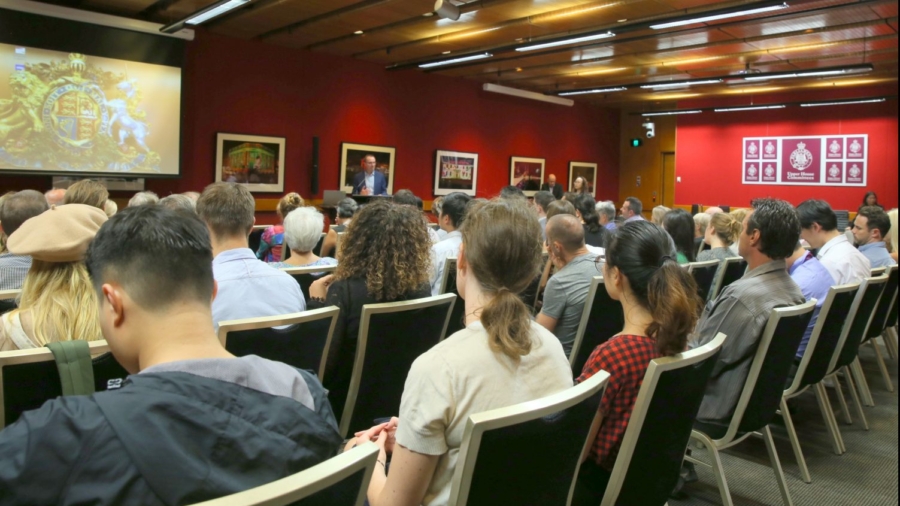More than 100 people attended the “Harvested Alive-Ten Years of Investigations” film screening at NSW Parliament House last Wednesday, April 11.
The audience response to the documentary was overwhelming with many expressing feeling a sense of urgency after watching the film for the need to end crimes of forced organ harvesting in China.
Many signed petitions and said that Australians and the Australian government can do more to stand behind human rights.
The one-hour award-winning documentary details significant evidence that has been gathered regarding the state-sanctioned, military-controlled forced organ harvesting of prisoners of conscience that continues to occur in China.
The film was produced shortly after the release of a 2016 report by the World Organization to Investigate the Persecution of Falun Gong (WOIPFG) on crimes of live organ harvesting from adherents of Falun Gong in China.
The report compiled evidence of which 95 percent was sourced directly from the doctors, judges, legislators, military officials, government officials, the media, and hospital websites found to be linked to organ harvesting activities in China.
The investigation and research revealed an unthinkable situation – that China’s state-controlled hospitals, judiciary, and military had been working together under the authority of former Chinese president Jiang Zemin to mercilessly slaughter persecuted Falun Gong practitioners and harvest their organs.
Via internet link, WOIPFG’s chief investigator Dr. Wang Zhiyuan joined the audience for a Q&A discussion from New York. One audience member asked: “Does the CCP harvest organs from Falun Gong because they are afraid of them, or because they are very healthy and have healthy organs?”
Dr Wang answered: “The CCP has three strategies for persecuting Falun Gong: ‘ruin their reputations, bankrupt them financially, and destroy them physically.’ Organ harvesting is a strategy for the CCP to eliminate Falun Gong physically.”
He explained further: “The system encourages the organ harvesting crimes as they make huge profits from it. At the same time, they use the strategy to bind all the people who engaged in the crime together with this huge killing machine.”
Another audience asked, “What is the estimation of the profit for this industry?”
“I can give you some examples,” Dr Wang said. “The No. 3 military hospital in China had a profit of 30 million Chinese yuan (US$4.4 million) in 2006. By 2011, it increased to 230 million (US$33.8 million) — 8 times more than five years ago.”
“In the late 1990s, the Third Military Medical University affiliated with Daping Hospital had an annual profit of 36 million (US$5.3 million), and by 2009, the annual profit exceeded to 900 million (US$132.3 million). It increased more than 25 times.”
NSW Greens MLC David Shoebridge who hosted the event told the audience: “I had a conversation with an organ transplant surgeon from Sydney.
“He said one of his colleagues had spoken to him and said: ‘I have an ethical dilemma. One of my patients who is on long-term dialysis said he won’t be turning up for dialysis on Monday because he going to go to China to receive an organ transplant.’”
Shoebridge continued, “China has a very developed organ transplant system which has dozens and dozens of facilities with very large, modern, and high capacity operating theatres that can carry out hundreds of thousands of organs transplants every year.”
“On the other hand, they have an infantile organ donation system. The Chinese culture is resistant to the organs donations. They have only begun voluntary organ donation last few years ago.
“Put that together, and you get maybe 5000 donations a year but the industry has the capacity to deliver at least 100,000 transplant a year. Where does the other 95% come from?
“The shortfall must be made up somewhere … made up unethically.
“That’s why we have the bill that I presented in NSW government to make it a crime for anyone from New South Wales to travel anywhere overseas and engage in unethical organ transplants,” he said.
People reacted overwhelmingly after viewing the movie and gathered around the information table to sign the petition. One government employee, Brad, said after he signed the petition: “I’ve done my bit and I hope it starts from there.”
Musician Danielle said: “I’ve heard there is misconduct going on in China, but I did not look it further. I was shocked after watching the movie and the numbers presented in the movie were obvious.” She then said: “I hope the world stands behind what we should, in terms of human rights. I hope we have the courage to put people above the profits and be strong to against this type of behaviour.”
Queenie who works in the finance sector said: “For me, it’s very moving because it’s a human rights issue. It is widespread and is very disturbing. I was surprised there was not more media coverage in Australia about the persecution, which is a sad thing. But it will go down to the history as the ‘Nazi persecution two.’”
She suggested the government should pass the legislation to ban organ tourism. She also thinks that strong action should be taken globally. “It isn’t going to be sufficient, as to stop individuals going to China for transplants won’t hurt China very much. The world should come together and put the economic sanctions on Chinese government.”
The movie screening was co-sponsored by The International Coalition to End Transplant Abuse in China (ETAC) and Doctors Against Forced Organ Harvesting (DAFOH).
From The Epoch Times

